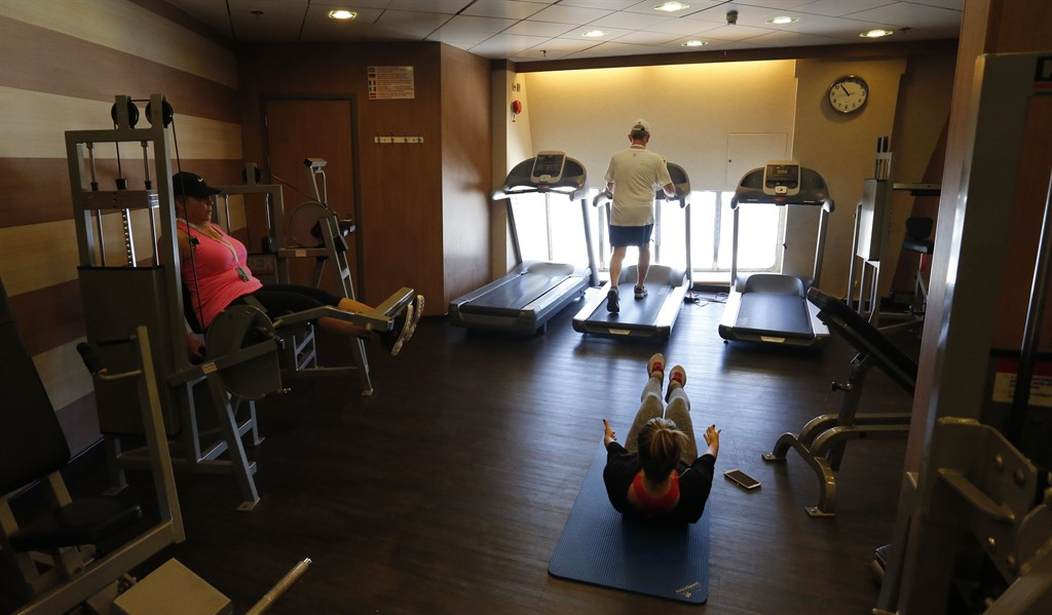Over the past year, most Americans have been stuck at home, unable to partake in physical activity at gyms and other recreational facilities. One of the awful consequences of this year-long government-mandated inactivity is that many Americans have gained quite a bit of weight.
According to a new study from the American Psychological Association (APA), “a majority of adults (61%) experienced undesired weight changes – weight gain or loss – since the pandemic started, with 42% reporting they gained more weight than they intended. Of those, they gained an average of 29 pounds (the median amount gained was 15 pounds) and 10% said they gained more than 50 pounds.”
Those statistics are startling.
So, why have Americans gained so much weight since the pandemic began?
One of the biggest reasons, according to the APA study, is stress due to the pandemic and associated lockdowns. “We’ve been concerned throughout this pandemic about the level of prolonged stress, exacerbated by the grief, trauma and isolation that Americans are experiencing. This survey reveals a secondary crisis that is likely to have persistent, serious mental and physical health consequences for years to come,” said Arthur C. Evans Jr, PhD, APA’s chief executive officer.
Indeed, stress and weight gain go together like peanut butter and jelly. As the Mayo Clinic puts it, “during times of particularly high stress, you may eat in an attempt to fulfill emotional needs — sometimes called stress eating or emotional eating. And you may be especially likely to eat high-calorie foods during times of stress, even when you're not hungry.”
And as we all know, as a result of the lockdowns, millions of Americans have been stuck at home, stressed to the max. This is especially true for parents with children at home. Not only do parents have to deal with their own economic uncertainty. They also have had to become full-time teachers.
Recommended
As the APA report notes, “The pandemic has taken a particularly heavy toll on parents of children under 18. While slightly more than 3 in 10 adults (31%) reported their mental health has worsened compared with before the pandemic, nearly half of mothers who still have children home for remote learning (47%) reported their mental health has worsened; 30% of fathers who still have children home said the same. Parents were more likely than those without children to have received treatment from a mental health professional (32% vs. 12%) and to have been diagnosed with a mental health disorder since the coronavirus pandemic began (24% vs. 9%). More than half of fathers (55%) reported gaining weight, and nearly half (48%) said they are drinking more alcohol to cope with stress.”
And, as the APA report shows, the stress from lockdowns is also having an outsized impact on the mental health, and waistlines, of minorities in particular.
“Further, people of color reported unintended physical changes during the pandemic. Hispanic adults were most likely to report undesired changes to sleep (78% Hispanic vs. 76% Black, 63% white and 61% Asian), physical activity levels (87% Hispanic vs. 84% Black, 81% Asian and 79% white) and weight (71% Hispanic vs. 64% Black, 58% white and 54% Asian) since the pandemic began. Black Americans were most likely to report feelings of concern about the future. More than half said they do not feel comfortable going back to living life like they used to before the pandemic (54% Black vs. 48% Hispanic, 45% Asian and 44% white) and that they feel uneasy about adjusting to in-person interaction once the pandemic ends (57% Black vs. 51% Asian, 50% Hispanic and 47% white),” according to the study.
Perhaps the saddest aspect of the stress and weight gain due to the pandemic and draconian lockdowns is the long-term impact this will likely have on millions of Americans. For instance, these Americans are more likely to suffer from high blood pressure, diabetes, heart disease, etc.
Years from now, historians will look back and determine that the lockdowns were an unequivocal policy blunder of epic proportions. The immediate aftermath of the lockdowns has been the shuttering of untold numbers of small businesses. Many of which will never return.
The long-term toll that a year of lockdowns will have on Americans’ mental and physical health is perhaps much more concerning.

























Join the conversation as a VIP Member